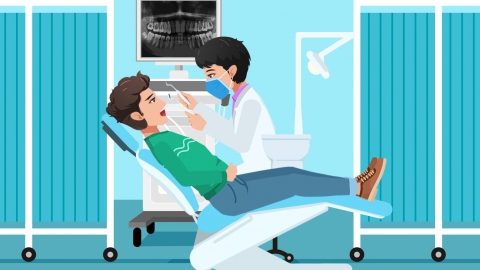What are the risks of extracting wisdom teeth?
Generally, as a common oral surgical procedure, wisdom tooth extraction may involve potential risks including postoperative bleeding, adjacent tooth damage, dry socket, nerve injury, and maxillary sinus perforation. A detailed analysis is as follows:

1. Postoperative bleeding: Minor oozing shortly after wisdom tooth extraction is normal, but in some cases prolonged bleeding may occur. Inappropriate management of blood vessels during surgery, rinsing the mouth too early after surgery, or chewing hard objects may cause the blood clot to dislodge, resulting in persistent bleeding.
2. Adjacent tooth damage: When there is insufficient space for wisdom tooth growth, the tooth may tilt and press against adjacent teeth. During extraction, improper operation or tight adhesion between the wisdom tooth root and adjacent tooth may cause enamel wear, root resorption, or even loosening of the adjacent tooth, affecting normal chewing function.
3. Dry socket: Two to three days after surgery, if the blood clot dislodges abnormally, exposure of the alveolar bone to the oral environment may easily lead to bacterial infection and development of dry socket. Patients may experience severe pain, which can radiate to the ear and neck, and may also be accompanied by oral malodor.
4. Nerve injury: Important nerves such as the inferior alveolar nerve and lingual nerve are located near the wisdom tooth. During extraction, nerve irritation or traction from instruments, or close proximity between the wisdom tooth root and nerves may cause nerve damage, resulting in numbness of the lower lip, chin, or tongue. Most cases of numbness gradually resolve, although in some cases it may persist long-term.
5. Maxillary sinus perforation: In some individuals, the roots of the wisdom teeth are in close proximity to the maxillary sinus cavity, or even located within it. During extraction, maxillary sinus perforation may occur, causing symptoms such as air leakage from the nose, or nosebleeds. In severe cases, maxillary sinusitis may develop.
Patients are advised to follow postoperative medical instructions, avoid touching the wound with the tongue or sucking actions, refrain from brushing teeth or rinsing the mouth for 24 hours, and consume mainly cool liquid or semi-liquid foods. Maintaining good oral hygiene can help reduce the risk of complications and promote wound healing.





